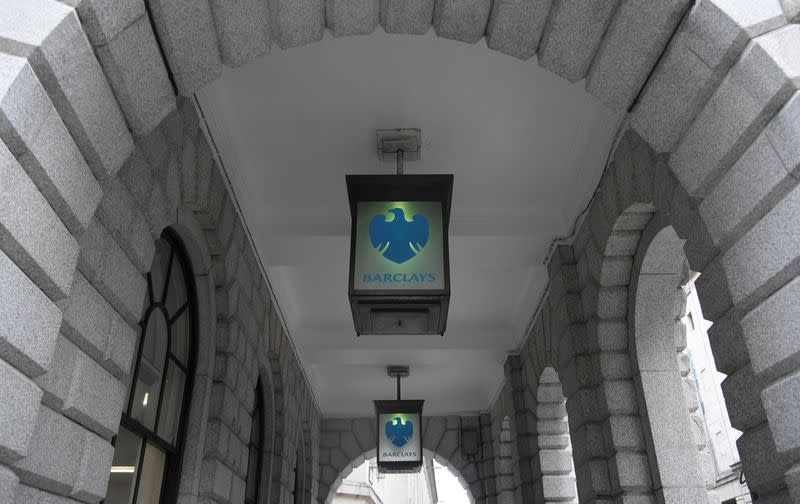Barclays Q1 profit falls 12% as trading slump hits

By Lawrence White and Sinead Cruise
LONDON (Reuters) -Barclays reported a slightly smaller than expected 12% fall in first quarter profit on Thursday, boosting confidence among investors that its turnaround task was on track despite lower income from trading and sluggish mortgage demand.
The British bank reported pretax profit for the January-March period of 2.3 billion pounds ($2.84 billion), down from 2.6 billion pounds a year ago and narrowly above analysts' forecasts for 2.2 billion.
Its shares were trading 4.3% up at 0840 GMT compared with a 0.5% rise in the FTSE 100 index.
Barclays is bidding to restore investor faith in its universal banking business model, after years of share price underperformance, clashes with activists over the role of its investment bank, and management turnover.
The British bank said in a long-awaited strategy review on Feb. 20 it would invest in its high-returning domestic banking business, as well as axing 2 billion pounds of costs and ramping up payouts to shareholders.
"Barclays has posted a strong foundation for the delivery of 2024 guidance. Now they need to maintain the momentum," said Max Georgiou, analyst at Third Bridge, describing the lender's planned savings targets as "challenging" unless more jobs are cut this year.
Thursday's results were the first under the lender's new structure, reorganised into five operating divisions instead of three in an effort to provide clearer disclosure on performance and management accountability.
The lender now reports results for Barclays UK, Barclays UK Corporate Bank, Private Bank and Wealth Management, Investment Bank, and U.S. Consumer Bank.
Total investment bank income fell 7%, just shy of expectations, and the unit's overall return on tangible equity (ROTE) of 12% was 2.4% percentage points lower than the first quarter of 2023.
Still, the performance of the under-pressure unit was in line with its long-term target.
Barclays said income in its traditionally strong Fixed Income, Currencies and Commodities (FICC) unit fell 21% as clients' trading slowed and against a strong year-ago comparison.
Investment banking advisory fees slid 30% as it failed to capture merger advisory fees.
Equities revenue rose 25%, meanwhile, as the bank performed strongly in both derivatives and cash equities trading.
RIVALS OUTPERFORM
Barclays' investment bank performance overall lagged rivals on Wall Street, where the top five players on average saw FICC trading revenues fall 3%, equities rise 6%, and investment banking fees rise 25%, according to research from Jefferies.
Rival Deutsche Bank on Thursday posted a better-than-expected 10% increase in first-quarter profit, citing a bounce back in fixed-income trading and deal-making revenue at its investment banking division.
All five of Barclays' business divisions reported lower ROTE than their first-quarter 2023 comparisons.
The UK Corporate Bank was the laggard, posting ROTE of 15.2% from 21.7% a year ago as a 10% slide in income from transaction banking offset an 18% rise in corporate lending.
Income in the UK bank division, which specialises in consumer and home loans, also fell 7%, amid increased competition in the mortgage market. At 163 billion pounds, mortgage loans and advances echoed the previous five quarters.
But the unit's net interest margin rose 2 basis points to 3.09% as the pace of savers moving money to high-returning deposit products slowed.
The British bank also said it would sell an Italian retail mortgage book, and reinvest proceeds in its higher-returning domestic business. Its acquisition of Tesco Bank is due to complete by end-2024.
The Italian deal will conclude in the second quarter of this year, generate a pretax loss of around 225 million pounds and be neutral to the bank's capital levels, Barclays said.
($1 = 0.8017 pounds)
(Reporting By Lawrence White and Sinead Cruise; Editing by Emelia Sithole-Matarise)

 Yahoo News
Yahoo News 
